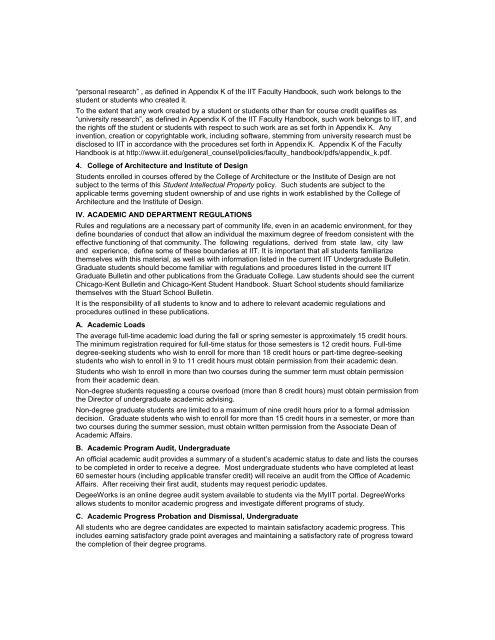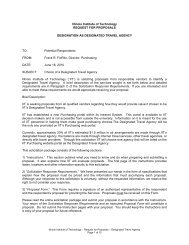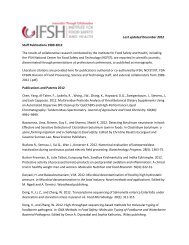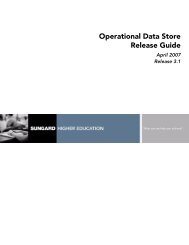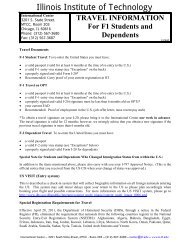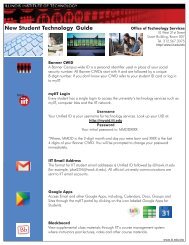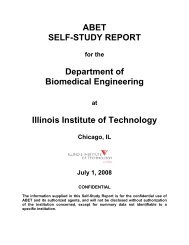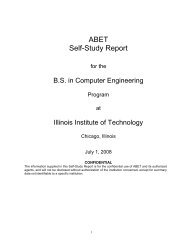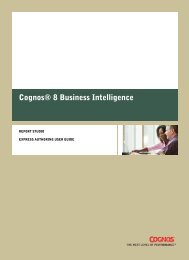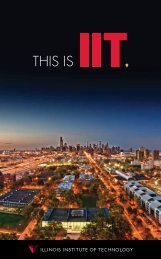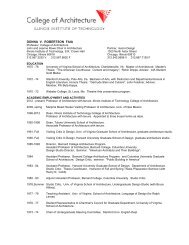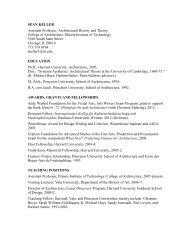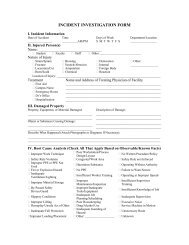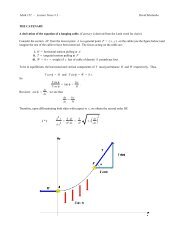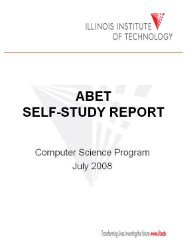Download entire Student Handbook - Illinois Institute of Technology
Download entire Student Handbook - Illinois Institute of Technology
Download entire Student Handbook - Illinois Institute of Technology
Create successful ePaper yourself
Turn your PDF publications into a flip-book with our unique Google optimized e-Paper software.
“personal research” , as defined in Appendix K <strong>of</strong> the IIT Faculty <strong>Handbook</strong>, such work belongs to the<br />
student or students who created it.<br />
To the extent that any work created by a student or students other than for course credit qualifies as<br />
“university research”, as defined in Appendix K <strong>of</strong> the IIT Faculty <strong>Handbook</strong>, such work belongs to IIT, and<br />
the rights <strong>of</strong>f the student or students with respect to such work are as set forth in Appendix K. Any<br />
invention, creation or copyrightable work, including s<strong>of</strong>tware, stemming from university research must be<br />
disclosed to IIT in accordance with the procedures set forth in Appendix K. Appendix K <strong>of</strong> the Faculty<br />
<strong>Handbook</strong> is at http://www.iit.edu/general_counsel/policies/faculty_handbook/pdfs/appendix_k.pdf.<br />
4. College <strong>of</strong> Architecture and <strong>Institute</strong> <strong>of</strong> Design<br />
<strong>Student</strong>s enrolled in courses <strong>of</strong>fered by the College <strong>of</strong> Architecture or the <strong>Institute</strong> <strong>of</strong> Design are not<br />
subject to the terms <strong>of</strong> this <strong>Student</strong> Intellectual Property policy. Such students are subject to the<br />
applicable terms governing student ownership <strong>of</strong> and use rights in work established by the College <strong>of</strong><br />
Architecture and the <strong>Institute</strong> <strong>of</strong> Design.<br />
IV. ACADEMIC AND DEPARTMENT REGULATIONS<br />
Rules and regulations are a necessary part <strong>of</strong> community life, even in an academic environment, for they<br />
define boundaries <strong>of</strong> conduct that allow an individual the maximum degree <strong>of</strong> freedom consistent with the<br />
effective functioning <strong>of</strong> that community. The following regulations, derived from state law, city law<br />
and experience, define some <strong>of</strong> these boundaries at IIT. It is important that all students familiarize<br />
themselves with this material, as well as with information listed in the current IIT Undergraduate Bulletin.<br />
Graduate students should become familiar with regulations and procedures listed in the current IIT<br />
Graduate Bulletin and other publications from the Graduate College. Law students should see the current<br />
Chicago-Kent Bulletin and Chicago-Kent <strong>Student</strong> <strong>Handbook</strong>. Stuart School students should familiarize<br />
themselves with the Stuart School Bulletin.<br />
It is the responsibility <strong>of</strong> all students to know and to adhere to relevant academic regulations and<br />
procedures outlined in these publications.<br />
A. Academic Loads<br />
The average full-time academic load during the fall or spring semester is approximately 15 credit hours.<br />
The minimum registration required for full-time status for those semesters is 12 credit hours. Full-time<br />
degree-seeking students who wish to enroll for more than 18 credit hours or part-time degree-seeking<br />
students who wish to enroll in 9 to 11 credit hours must obtain permission from their academic dean.<br />
<strong>Student</strong>s who wish to enroll in more than two courses during the summer term must obtain permission<br />
from their academic dean.<br />
Non-degree students requesting a course overload (more than 8 credit hours) must obtain permission from<br />
the Director <strong>of</strong> undergraduate academic advising.<br />
Non-degree graduate students are limited to a maximum <strong>of</strong> nine credit hours prior to a formal admission<br />
decision. Graduate students who wish to enroll for more than 15 credit hours in a semester, or more than<br />
two courses during the summer session, must obtain written permission from the Associate Dean <strong>of</strong><br />
Academic Affairs.<br />
B. Academic Program Audit, Undergraduate<br />
An <strong>of</strong>ficial academic audit provides a summary <strong>of</strong> a student’s academic status to date and lists the courses<br />
to be completed in order to receive a degree. Most undergraduate students who have completed at least<br />
60 semester hours (including applicable transfer credit) will receive an audit from the Office <strong>of</strong> Academic<br />
Affairs. After receiving their first audit, students may request periodic updates.<br />
DegeeWorks is an online degree audit system available to students via the MyIIT portal. DegreeWorks<br />
allows students to monitor academic progress and investigate different programs <strong>of</strong> study.<br />
C. Academic Progress Probation and Dismissal, Undergraduate<br />
All students who are degree candidates are expected to maintain satisfactory academic progress. This<br />
includes earning satisfactory grade point averages and maintaining a satisfactory rate <strong>of</strong> progress toward<br />
the completion <strong>of</strong> their degree programs.


